SpeakEasy Stage continues its superb season with a regional premiere and one of the best local productions of a Tony-Award winning musical I’ve ever seen: FUN HOME. I saw this heartbreaking musical last season in Boston’s big Opera House; the voices were stronger, but the intimate setting the show finds onstage at SpeakEasy gives this tale of a daughter growing up in a funeral home run by her father, tenderness and depth.
The minute we enter the theater, we’re drawn into the past by way of a warm, golden light, burnishing a beautiful set which promises a treasure chest of secrets; there’s a giant wall of books, victorian furniture, candelabra, a grand piano, and eventually there will be musicians onstage, strings and reeds channeling deeply held feelings and unspoken truths. It’s an achingly emotional score by Jeanine Tesori and evocative work by a veteran design team: Cristina Todesco, Charles Schoonmaker, Karen Perlow, Andrew Duncan Will, and Jennifer Butler.
At the outset narrator Alison Bechdel, on whose graphic memoir the show is based, announces: “Dad and I both grew up in the same small Pennsylvania town. And he was gay, and I was gay, and he killed himself, and I became a lesbian cartoonist.” Then she sets out to untangle the ironically parallel paths that brought them to that loaded intersection, in her words, of “sexual coming of age, death, and trauma.”
Lisa Kron (book and lyrics) has structured FUN HOME like a three-sided prism of frozen time as Alison (a true-hearted Amy Jo Jackson) contemplates herself in three parts: now as an adult, looking back at herself as a child, and as a college student (Ellie van Amerongen who, along with Tyler Simahk– excellent as a variety of handsome young men– possess the best voices in the cast) when she came out. “Medium Alison” is irresistible as she sings out her infatuation and first sexual encounter with “Joan” (a no-nonsense Desire Graham) and we are swept up in her giddy, runaway desire.
The rich irony of Bechdel’s growing up in a funeral home is not lost on us; she will dig up the ghosts, resurrect memories, and unearth the secrets that shaped her life. That there was “fun” in the “funeral” home is a template for the dual tone and terrain to be navigated here, pain and beauty, lightness in the the dark passage through the mysteries of childhood to the forging of a personal identity.
Sometimes the memories are pretty funny. There’s an hilarious number featuring the Bechdel sibs jumping in and out of a casket singing a commercial they wrote called “Come to the Fun Home.” These kids are accomplished performers: Cameron Levesque, Luke Gold, and especially Marissa Simeqi as Small Alison who feels ridiculous in dresses. One day she spots a delivery woman in dungarees and has an epiphany; wide eyed with recognition, she launches into a gorgeous, revelatory song called “Ring of Keys.” Simeqi is an exceptionally natural actress; I was smitten.
Sometimes the memories are painful; her mother is the long suffering Helen. Laura Marie Duncan brings grace to her “Days and Days” of a tragic marriage. And then there’s a pivotal car ride and unresolved conversation with her father Bruce who hid his homosexuality beneath a veneer of historic restoration, books, and tending to the dead. Bruce (Todd Yard) is brutally affecting in this part, conveying the self-hatred and rage of a man boxed in and suffocating slowly until he puts an end to it. But Alison is out and looking in, breathing air into the past, so she can live.
Director Paul Daigneault has set the action on a thrust stage, the audience on three sides, the floor a map of the past; we see the outlines of where the rugs will be laid in the childhood home that will take shape before us. This staging not only reiterates the emotional and psychological journey Alison is taking, but invites the audiences to do likewise. The audience sees each other literally across the actors, and perhaps we look inward too. The play is certainly about the power of seeing and being seen, how especially important it is for any child to be seen clearly by a parent, and how difficult it was for Alison’s father to see his daughter clearly because then he would also be seen by her on their remarkably parallel paths, and that might have been unbearable.
Whose childhood wasn’t troubled by the inscrutability of the adults who passed through their lives, mysteries that would become clear only through the lens of reflection? Who might not wish to go back and walk through those rooms where we lived as children, now safely, trying to crack the secrets they contained? This show does that. It will break and warm your heart– and you’ll be the better for it.
DO NOT MISS “FUN HOME” at the BCA Calderwood Pavilion through November 24!



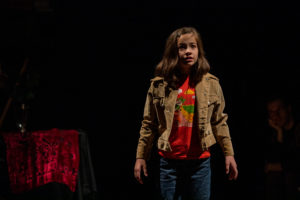
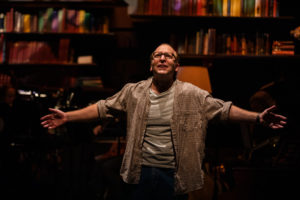
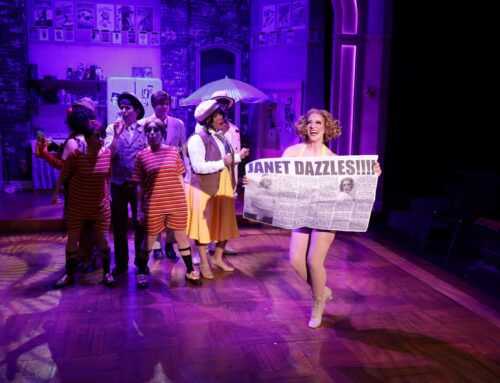

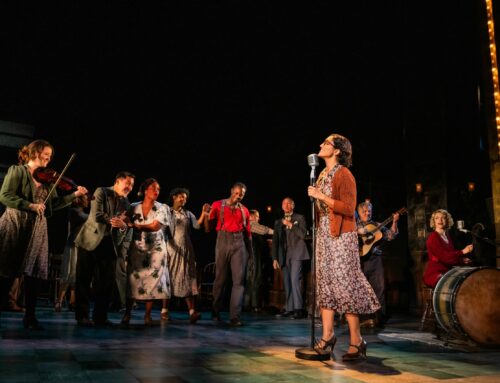
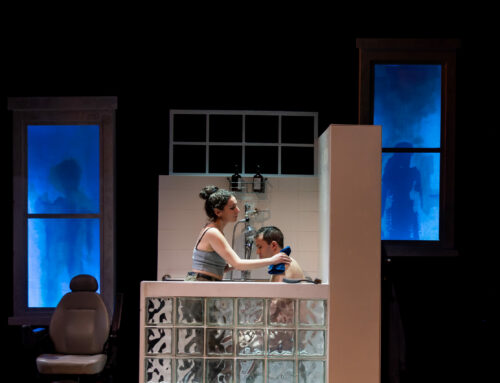

Leave A Comment
You must be logged in to post a comment.